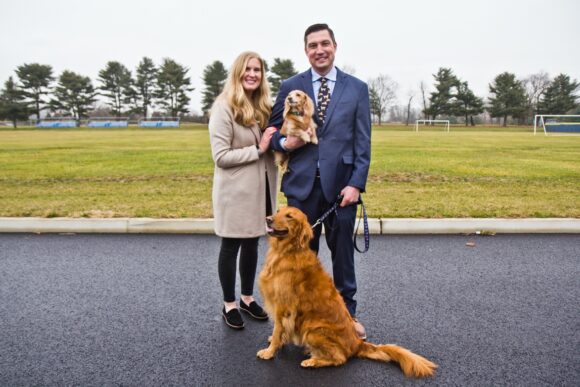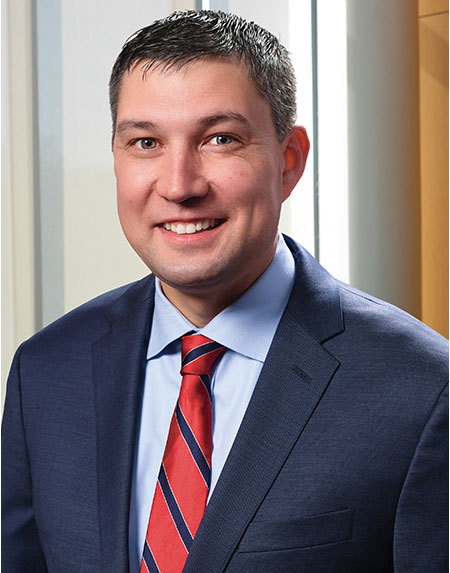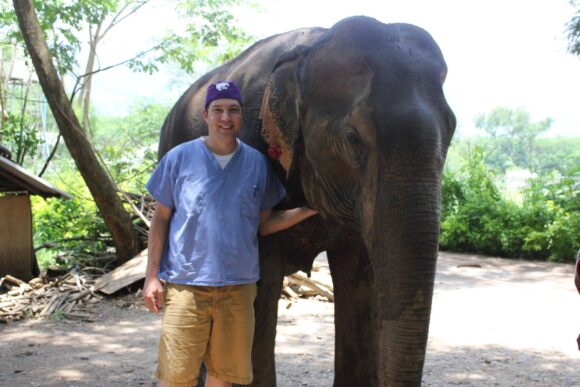
Matthew Edson with wife Jenna, MSW graduate of Rutgers-Camden, and their dogs Frankie and Shadow.
The announcement that Matthew Edson, Rutgers animal sciences graduate, would be the Founding Dean of the Rowan University School of Veterinary Medicine delighted his former Rutgers professors.
Carol Bagnell, professor and chair of the Department of Animal Sciences at the School of Environmental and Biological Sciences (SEBS), taught Matthew as an undergraduate, and was among the first to congratulate him.

Matthew Edson (CC’07), founding dean, Rowan University School of Veterinary Medicine.
“We are very proud of you, as a 2007 graduate of our program, for providing the leadership for this very exciting initiative. It doesn’t seem too long ago that you were a student on the Cook-Douglass campus,” she wrote to Matthew. “It is very rewarding to see your success in establishing an award-winning veterinary practice and now leading this ground-breaking effort in veterinary medical education.”
As department chair of the largest undergraduate program at SEBS, Bagnell hopes to find areas to partner with the Rowan University School of Veterinary Medicine, something shared by her former student. Matthew is in a position to facilitate such potential partnerships as the founding dean and touches on this aspiration as well, as he shares his journey from Rutgers animal sciences undergraduate to his new leadership role in veterinary medicine in the state.
Did you have a background in farming?
I was born in Mount Holly, NJ, and grew up in the neighboring town of Eastampton. I was raised on a small farm with goats, sheep, horses, chickens, and pigs. We had some dairy goats and egg layers but the rest were mostly pets. I was active in Burlington County 4-H growing up. My first job was a cow milker at Sunnyside Farms in Westampton, NJ, which led to a dairy interest as well. In 1999 I ended up on our 4-H NJ Dairy Bowl team and went to the nationals at the North American International Livestock Exposition in Louisville, KY.
What drew you to Rutgers and the animal sciences program, in particular?
I was pretty sure I was on the path to veterinary school early on, so the strength of the animal science program and hands-on nature of the experiences offered at Rutgers were a big plus. With a lot to do on the farm at home, the proximity was important as well. I think one of the biggest drivers was the connection between the school and Rutgers Cooperative Extension. I had experienced elements of Rutgers through 4-H, which gave me a good impression of then Cook College, now SEBS.
Do any classes or experiences stand out as very impactful to your post-undergrad or career choices?
Taking the 3-day “Dairy Cattle Artificial Insemination” that the animal science department offered in conjunction with Genex, an organization that provides genetic and reproductive solutions to the dairy and beef cattle industry, was a great experience. It allowed us to apply some of the book knowledge we had learned to a real-life, clinical-type experience. I also really enjoyed “Principles of Integrative Physiology” with Dr. Henry John-Alder, professor in the Department of Ecology, Evolution and Natural Resources.
Have you been back to campus since you graduated?
Since graduation, I came back to campus to speak to the pre-veterinary club a few years in a row and was also back once to judge state 4-H public presentations at Hickman Hall. It’s been a few years now since I’ve been back on campus. As an alumnus, I welcome any opportunity to share my journey in veterinary medicine and support of the students in the animal sciences program.

Matthew Edson pictured during a surgical visit to Thailand early in his veterinary career.
After graduating from Rutgers, you headed to the Midwest to get your degree in veterinary medicine. What was that transition like?
One of the reasons I picked Kansas State was the small town the school was in and because the folks I met there during interviews were so nice. Feeling “at home” in that respect made the transition much easier. Academically, veterinary school is certainly more demanding in some respects than undergraduate, mostly due to the volume of information and number of concurrent classes. I think the undergraduate program at Rutgers did a great job of preparing us for veterinary school. During the first year of vet school, many of the classes seemed like a review of much of the content from my program at Rutgers, which made adjusting much more easy as it didn’t seem nearly as overwhelming having covered that material before.
How would you describe your journey to this point in your career?
It’s been an interesting path from Rutgers to vet school to private practice and back into academic veterinary medicine. Without the foundation from my time in the animal sciences program at Rutgers, I doubt I’d be in this position today. When I graduated from K-State, I already had plans to return home to start a practice in my home town. What started out as an ambulatory large animal practice (just me, my dog Cody, and a toolbox full of supplies driving my old pickup truck from farm to farm around South Jersey) has grown into a multi-location, multi-doctor, mixed animal practice. When I started to get involved with the vet school project at Rowan a couple years ago I didn’t do so thinking I’d be making a career change back into academia, but the opportunity to participate in the start of such a unique program that’s so needed in our state wasn’t something I could pass up.
When and how did you become involved in the process that’s led to the launching of the first school of veterinary medicine in New Jersey?
Several years ago, Rowan began to explore the idea of starting a veterinary school and reached out to the New Jersey Veterinary Medical Association (NJVMA) for input. I was the NJVMA President at that time, so I was involved in those initial discussions. I’ve been able to develop a strong network of other veterinary professionals in NJ during my years in practice and my experience serving as a site visitor for the AVMA’s vet school accrediting body gave me insight on the need to establish and maintain a veterinary program, so I became more and more engaged in the project. I started as a consultant for Rowan during the feasibility study portion and after a year or so of that it was decided that the project was truly moving forward. I was offered the Founding Dean position at that point and started in that role in June 2021.
Broadly, what were some of the challenges you and colleagues faced in bringing this vision to fruition?
There are endless challenges to starting a program of this scale and we’ll continue to have more as we progress. Most of the newer veterinary programs in the U.S. are distributive, meaning most of the student clinical training is provided at partner facilities outside of the school itself. We wanted to keep more of the clinical experiences in-house, which involves not only starting a school but starting a teaching hospital as well. The recent $75 million commitment from the state has alleviated some of the funding challenges. We’re planning a hybrid program where the majority of the clinical experiences will be in our large and small animal teaching hospitals with a smaller portion of the clinical experiences at outside clinical partner sites. Keeping the cost of veterinary education affordable for students is challenging as well, but that’s something that’s always in our minds while planning every aspect of this program.
Can you describe the impact of the founding of the first such school in the state?
For too long, New Jersey residents have had to compete for limited out-of-state seats and pay much more expensive out-of-state tuition rates in order to attend veterinary school. Student debt and a shortage of veterinary staff are both major issues in our profession right now. Offering an in-state tuition option will help to reduce student debt for graduates and keep those new doctors in New Jersey when they finish their program. I think this will be a great addition for our state, both from an education standpoint and for the clinical resources and research opportunities it will provide.
Can you share broadly what’s planned for graduates who wish to enroll?
We’re planning a full spectrum of veterinary educational programs from entry-level A.S. programs in veterinary technology, B.S. programs in veterinary technology (management and clinical tracks), M.S. and Ph.D. programs in Veterinary Biomedical Science, the Doctor of Veterinary Medicine degree programs and post-graduate specialty training (specialty internships and residencies). Accelerated degree programs such as a joint DVM/MBA with Rowan’s Rorher College of Business are already in the planning process. The veterinary technician program will be managed by Rowan College of South Jersey in partnership with the veterinary school and is planning to admit the first cohort of technician students in 2023. We’re hoping to admit our first DVM cohort in the fall of 2025. In all cases, those dates are pending approvals from the associated accrediting bodies. We’ve already had many interested applicants reach out for more details, but we’re still in the early stages and don’t have any more specifics just yet. We’ll be posting updates to the school’s website at www.rowan.edu/svm for those who are interested in finding out more.

